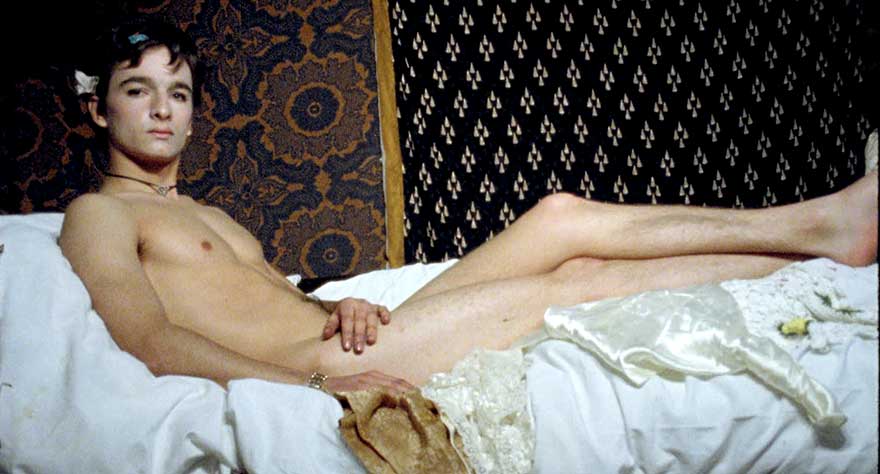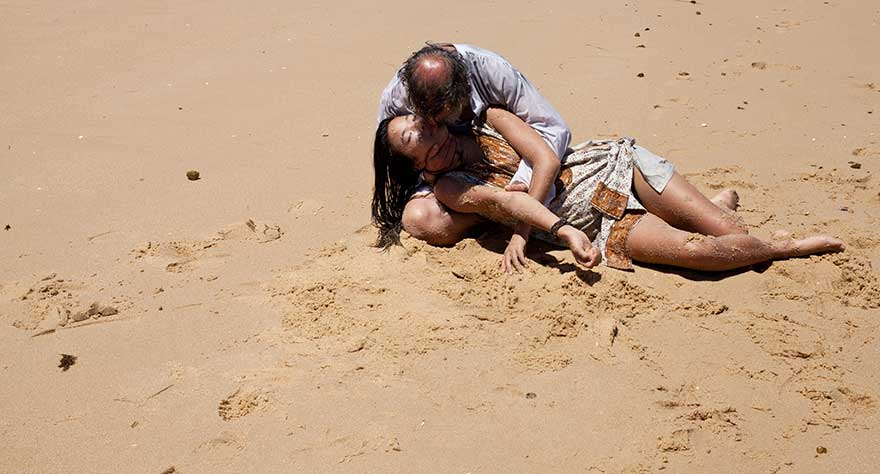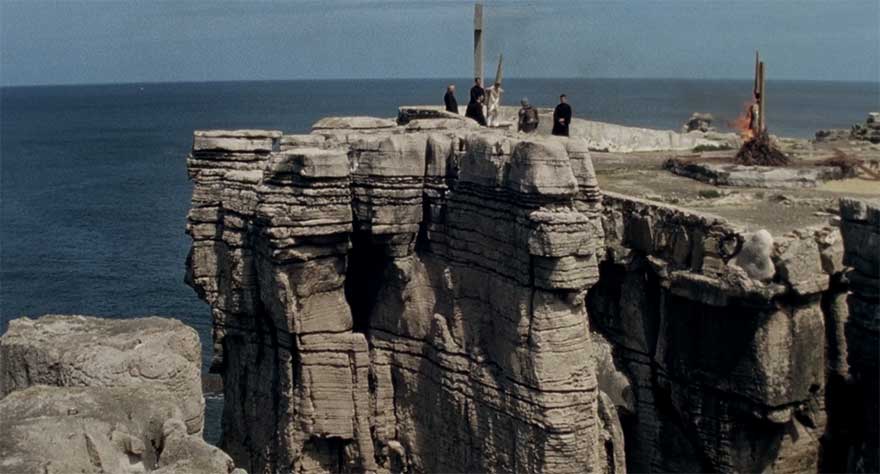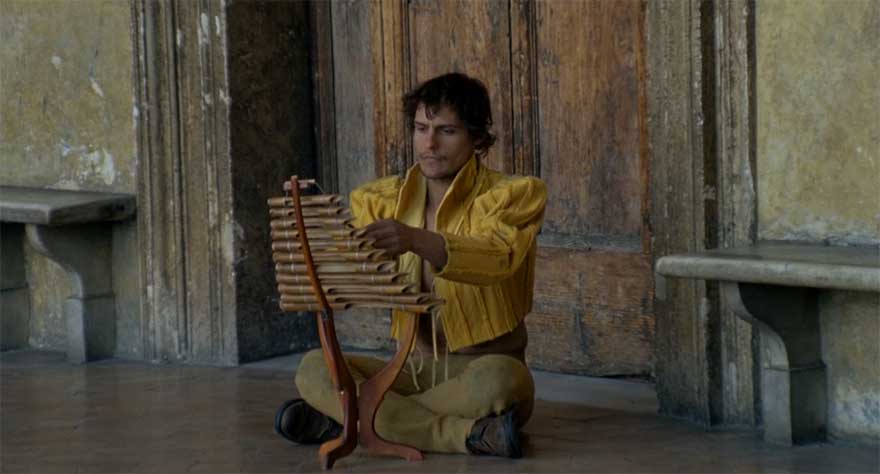Fearless Arrogance: The Short Films of Gabriel Abrantes

In addition to screening two feature films, the Film Society of Lincoln Center’s series ‘Friends With Benefits: An Anthology of Four New American Filmmakers’ includes a baker’s dozen of short films divided into four Short Programs. To find out more about the series visit the ‘Friends With Benefits’ website.
The Film Society of Lincoln Center has made filmmaker Gabriel Abrantes its focus for the shorts programs in the ‘Friend With Benefits’ series. Of the 13 films on the slate, divided across four programs, Abrantes directs or co-directs all but one (he also wrote all of them and appears in most), and the collection represents nearly his entire body of work. Seeing them as a collective over a short period of time makes two things abundantly clear about the auteur.
His fearlessness and his unwillingness to be contained by any specific set of creative guidelines are undeniable. His topics include Shakespearean works and the war in Iraq; the themes he tackles include incest, race relations, and global warming; and the storytelling styles he employs range from an ancient Greek comedy set in present-day Haiti to the exploration of a young man’s psyche by way of reality TV. Each of his films is as unique as those before it and after.
However, the fearlessness on the one side of the Abrantes coin shares an arrogance on the other. The filmmaker’s quest to display his intellectual superiority and prove his work is capital-A art comes with a cost: most of his films are difficult to consume and at times can be patience-testing. His topics, while intellectual, are dense, and his filmmaking style, rather than compensating for his dry material, instead complements it (at best) or compounds it (at worst). This is most evident in his scripts and how he directs his actors to deliver their lines. His dialogue is often vague or veiled, with long pauses between and throughout, and lines are routinely delivered in bored, listless monotones devoid of emotion.
Abrante’s performers—himself included—don’t act their parts so much as they deliver his message, and he has them do so in a way that their delivery of that message won’t upstage the message itself. This requires—almost demands—the viewer to have existing knowledge of the subjects he tackles so as to best understand the message he’s sending.
Program 1: Dreams, Drones, and Dactyls

This program contains three of Abrantes’s most recent works. They are the most humorous of his films and, collectively, the most accessible to a wider audience.
Taprobana
Portugal’s greatest poet, Luís Vaz de Camões is the subject of this 16th-century comedy. The poet lives a life on the lam from Portuguese authorities with his lover, Dinamene. The two engage in extreme drug-fueled hedonism (coprophilia alert) until he is captured. At the end of his life, he finds himself somewhere between heaven and hell, with the choice available of where he would like to finally reside. The hallucination of Petrarch is the highlight here.
Freud and Friends
About as close to mainstream comedy as the filmmaker gets, Abrantes stars as a man who is the test subject of a scientific breakthrough that allows people’s dreams to be seen on TV. When his scientist girlfriend sees that he dreams of her sister and that he envisions his own mother emanating from a fart, paradise finds trouble. Abrantes fully commits to his reality TV approach to the film, keeping it at 30 minutes and including two very funny commercials.
Ennui Ennui
This near-screwball comedy focuses on a representative from France attempting to negotiate disarmament with an Afghani warlord. Through a well-structured series of events, the rep’s daughter, who is along for the trip, is mistaken for the warlord’s daughter and captured. Also, President Obama carries on father/daughter-like conversations with a drone flying over Afghanistan.
Program 2: Slow Learners

Five of Abrantes’s earliest works, mostly with collaborators, are collected here. It’s interesting to see how his production values have improved as he has achieved greater critical success, and yet his creative weaknesses have not.
Olympia I & II
Both co-written with and co-starring Katie Widloski, Abrantes’s first two films (presented here as one film in two parts) draw inspiration from and breathes life into Manet’s painting “Olympia.” In the first part, Widloski is the supple courtesan who is the object of her offscreen brother’s desire. The second part bends genders and challenges race as it makes Abrantes the subject and Widloski as the maid, albeit in overt blackface. These two films set the stage for what will be recurring themes and appearances of incest, race, and nudity throughout Abrantes’s oeuvre.
Visionary Iraq
This early entry was co-written with, co-directed by, and co-stars Fort Buchanan‘s Benjamin Crotty, who plays one-half of a pair of siblings readying to depart for the Iraq war. Playing his adopted Angolan sister is Abrantes, in heavy brown face. The siblings (yes, who are sleeping with each other) learn shortly before they deploy that their father is profiting from the war. While in Iraq, the siblings are faced with a moral dilemma.
Too Many Daddies, Mommies, and Babies
After failing to save the Amazon from ultimate ruin, a pair scientists in a same-sex relationship decide to return home and start a family using the egg of one of the scientist’s sisters and the uterus of a surrogate mother. This is an interesting look at the effects of man on nature, and how nature still has all of the power.
Liberdade
Opening with a young man stealing Viagra at gunpoint in an Angolan pharmacy, this sweeping story of love, crime, and racial tension, ultimately told in flashback from co-writers/directors Abrantes and Crotty, is one of the most “Hollywood” things the auteur has done, and it showcases his broader creative potential. The filmmakers also make great use of a slowed-down version of Paul Simon’s “Diamonds on the Soles of Her Shoes” (featuring Ladysmith Black Mambazo), as well as Frank Sinatra’s “Very Good Year.” This is a must-see.
Baby Back Costa Rica
More music video than short film, this 5-minute effort, which would have played better alongside Palaces of Pity (in Program 3), features three teen girls on a ride home to their awaiting swimming pool. During the ride, they discuss, among other things, pizza and Judaism.
Program 3: Friends for Eternity

Only two films are part of this Program, but they make up over 80 minutes of runtime and spotlight the first two collaborations between Abrantes and Daniel Schmidt (The Unity of All Things).
Palaces of Pity (Palacios de Pena)
This coming-of-age story focuses on two present-day teen girls—cousins who are being played against each other by their wealthy, dying grandmother. The matriarch will give her fortune to only one of the girls. When she passes away, legalities create a situation where one of the girls must voluntarily renounce her claim to the fortune…or involuntarily do so (at the hands of the other, of course). At 58 minutes, it has all the trappings of a full-length feature but is encumbered by the filmmakers’ indulgence to inject a 13-minute dream sequence set in medieval times.
A History of Mutual Respect
Abrantes and Schmidt costar as friends on a rainforest journey. Schmidt is in pursuit of clean, pure sex, while Abrantes is waiting for the right person. When the object of both their desires appears, their friendship is (eventually) forever changed. This film opens with lingering shots of a waterfall accompanied by the recorded wisdom of Nina Simone.
Program 4: Three Adaptations

This collection of shorts have ties to long-ago days.
The Island is Enchanted with You (La Isla está Encantada con Ustedes)
This opening short of the final program, and the only one that doesn’t feature work by Abrantes, comes from Alexander Carver and Daniel Schmidt, the filmmaking duo behind The Unity of All Things. Instead of science, though, this film delves into history; specifically, it looks at the history of Puerto Rico. Flirting with timelines ranging from present day to pre-Colonial days, and employing a variety of filmmaking elements (the island pulses with light when it talks, years on the timeline are represented by miniature headless CGI people, there’s a full music video at one point), this is a clever and captivating short where the whole is greater than the sum of its parts.
Ornithes (Zwazo)
Returning to Abrantes, this short transplants Aristophanes’ 414BC play The Birds into modern-day Haiti. With dialogue spoken in Haitian Creole and Attic Greek, the film features colorful costuming and the wonderful line, as uttered by a local driving a car following a bird riding a horse (while the backing track to the remix of L’il Wayne’s 6 Foot 7 Foot beats in the background), “My problem is that the director thinks we can still have a Dionysian collective trance induced by polyphonic hexameters or comic dactyls in Attic Greek. It’s plain foolish.”
Fratelli
The final short of the final program, co-written and co-directed by Abrantes and Alexandre Melo, is a retelling of the prologue of Shakespeare’s The Taming of the Shrew. This isn’t the only connection to classic literature found here, though. Using some original costumes used in the 1972 film The Canterbury Tales, the filmmakers give an artistic nod to both Geoffrey Chaucer and Italian filmmaker Pier Paolo Pasolini.
Joel Hodgson, creator of Mystery Science Theater 3000, once said in an interview about the show’s humor that the right people will get the joke. His message was that while not everyone will understand everything, there will always be someone who will understand something. Such is the case of the works of Gabriel Abrantes—not every film will be for everyone, but each film will be for someone.
